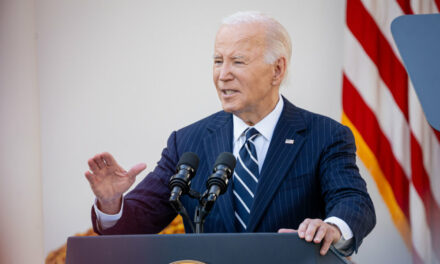We support our Publishers and Content Creators. You can view this story on their website by CLICKING HERE.
Mike Johnson (R-La.) says Republicans want to avoid brinkmanship with Democrats that could destabilize bond markets and weaken the dollar.
House Speaker Mike Johnson (R-La.) said on Jan. 7 that congressional Republicans plan to raise the nation’s borrowing limit through a sweeping party-line reconciliation bill designed to encompass President-elect Donald Trump’s policy priorities.
Johnson described the debt cap increase as a necessary, pro-forma measure to avoid brinkmanship with Democrats that could destabilize bond markets and weaken the dollar while reaffirming the Republican commitment to reducing—not expanding—government spending.
“The intention is to handle the debt limit in reconciliation in the process, and that way, as the Republican Party, the party in charge of both chambers, we get to determine the details of that,” Johnson said.
“If it runs through regular order or regular process and as a standalone, or as part of the appropriations, for example, then you have to have both parties negotiating, and we feel like we’re in better stead do it ourselves.”
There was no immediate reaction from Democrats to Johnson’s remarks.
Some Democrats have expressed support for raising the debt limit when Trump first floated the idea in December, including Sen. Elizabeth Warren (D-Mass.) and Rep. Rosa DeLauro (D-Conn.), the top Democrat on the House Appropriations Committee.
Johnson acknowledged internal divisions within the GOP regarding the debt ceiling and expressed confidence in resolving the differences through robust discussions.
“There is a broad range of opinion on that in our own conference and we are working through that,” Johnson said. “We’ll be having very deliberate, lengthy, white-board sessions with all our members,” he continued, adding that it’s “a really healthy thing to have that debate inside the tent and come to the solutions and the consensus together—people feel they have a sense of ownership when they do that.”
Johnson said that addressing the debt ceiling would remain a GOP priority while underscoring the Republican commitment to reducing government spending.
“Republicans and this majority in the House and the Senate, our intention and our mission is to reduce the size and scope of government,” he said. “To reduce spending in a meaningful way so we can restore fiscal sanity and get our country back on the right track.
“So raising the debt limit is a necessary step so that we don’t give the appearance that we’re going to default on the nation’s debt. That’s important to the bond markets and the stability and the dollar and all the rest.”
“But that does not mean that we have any intention whatsoever—or we’ll tolerate spending up to the new debt limit—the idea is to do exactly the opposite,” he said. “So while that is almost a pro-forma sort of step that must be taken, the commitment at the same time is to reduce spending, not to spend more.”
“The president has made it very clear: Social Security and Medicare have to be preserved,” Johnson said. “No one is coming in with the intention of cutting benefits in any way or anything. But we have to look at all spending and look at it very literally, while maintaining those commitments. The Republican Party is not going to cut benefits.”
Instead, Johnson said, Republicans would target what he described as fraudulent or wasteful government spending.
“There are many, many areas of fraud, waste and abuse,“ Johnson said. ”The government is too large. The agencies are too many. They have too many divisions and employees and all the rest. And there will be a very deliberate auditing of all of that in various aspects as we go through the process.”
Johnson said he expects that internal GOP deliberations on the debt ceiling—and the overall reconciliation package—would take place in the coming days.

 Conservative
Conservative  Search
Search Trending
Trending Current News
Current News 







